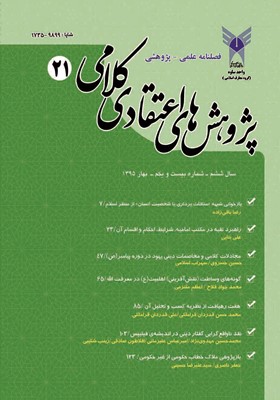هفت رهیافت از نظریه کسب و تحلیل آن
محورهای موضوعی : Islamic theology
محمد حسن قدردان قراملکی
1
,
علی قدردان قراملکی
2
![]()
1 - پژوهشگاه فرهنگ و اندیشه اسلامی
2 - دانشگاه معارف اسلامی
کلید واژه: جبر, اختیار, کسب, امر بین الامرین, اشاعره, علیت, فاعلیت,
چکیده مقاله :
درباره تفسیر فعل انسان از حیث اختیار و جبر، از سوی دین پژوهان رهیافتهای مختلفی ارائه شده است. اشاعره و در رأس آنان، ابوالحسن اشعری نظریه «کسب» را مطرح و مدعی شد که نقش انسان در فعل خویش کسب فعل و نه ایجاد آن است. لکن عالمان اشاعره در طول تاریخ در تبیین حقیقت آن دچار اختلاف شده و به تبع آن قرائتهای مختلفی ارائه کردهاند. نویسنده با فحص در آثار اشاعره به هفت رهیافت مهم از نظریه کسب دست یازیده است که در این مقاله با تحلیل و ارزیابی تقدیم میشود. در مقاله روشن خواهد شد که نظریات ارایه شده از تبیین حقیقت کسب ناتوانند و در آن آراء به نوعی به جبر یا به تفویض منتهی میشوند، لذا برخی از عالمان اشاعره به انکار نظریه کسب پرداخته و به نظریه «امر بین الامرین» امامیه روی آوردند
Regarding man’s actions, from viewpoint of compulsion or volition, among religion researchers, there are different approaches. Ash’arites and its head believe in theory of acquisition and claimed man’s role in his actions is acquisition, not creation. But during history Ash’arite ‘ulama, have got different ideas and readings concerning the reality of acquisition. Studying the Ash’arite works, the author found seven prominent approaches and then criticized and evaluated them. He demonstrated that the Ash’arite theories of compulsion or volition not only are not able to explain the reality of acquisition, but they lead to either compulsion or indeterminism. Therefore, some Ash’arite ‘ulama denied the theory of acquisition and accepted the Shi’i theory of intermediate position.
1. ابن خطیب، بیتا، القضاء والقدر بین الفلسفة والدین،بیروت، دار المعرفة.
2. ابن همام، کمال الدین محمد شافعی، 1425ق، المسامرة شرح المسايرة في العقائد المنجية في الآخرة، بیروت، المکتبه العصریهو
3. اشعری، ابوالحسن، بیتا، اللمع في الرد على أهل الزيغ و البدع، قاهره، المکتبه الازهریه للتراث.
4. اشعری، ابوالحسن، 1400ق، مقالات الإسلاميين و اختلاف المصلين، آلمان- ویسبادن، فرانس شتاینر.
5. ایجی- محقق دوانی- سید جمال الدین افغانی، 1423ق، التعلیقات علی شرح العقائد العضدیه.
6. ایجی- میر سید شریف، 1325ق، شرح المواقف، افست قم، الشریف الرضی.
7. باقلانی، ابوبکر، 1425ق، الإنصاف فيما يجب اعتقاده، لايجوز اعتقاده، لايجوز الجهل به، بیروت، دار الکتب العلمیه.
8. تفتازانی، سعد الدین، 1407، شرح العقائد النسفیه، قاهره، مکتبه الکلیات الازهریه.
9. تفتازانی، سعد الدین، 1409ق، شرح المقاصد، افست قم، الشریف الرضی.
10. جوزیه، ابن قیم، 1417ق، شفاء العليل في مسائل القضاء و القدر و الحكمة و التعليل، بیروت، دار الجمیل.
11. جوینی، عبد الملک، 1416ق، الإرشاد إلى قواطع الأدلة في أول الاعتقاد، بیروت، دار الکتب العلمیه.
12. رازی فخر الدین، 1411ق، المحصل، عمان، دار الرازی.
13. رازی فخر الدین، 1407ق، المطالب العالية من العلم الإلهي، بیروت، دار الکتاب العربی.
14. رازی، فخر الدین، 1986م، الأربعين في أصول الدين، قاهره، مكتبة الكليات الأزهرية.
15. رازی، فخر الدین، 1420ق، تفسیر مفاتیح الغیب، بیروت، داذ احیاء التراث العربی.
16. رازی، فخر الدین، 1383ش، چهارده رساله، تهران، انتشارات دانشگاه تهران.
17. سبحانی، جعفر، 1368ش، جبر و اختیار، قم، موسسه تحقیقاتی سید الشهدا.
18. شلتوت، محمود، 1379ش، تفسیر القرآن الکریم، تهران، المجمع العالمی للتقریب بین المذاهب الاسلامیه.
19. شهرستانی، محمد بن عبد الکریم، 1364، الملل و النحل، قم، الشریف الرضی.
20. طوسی، شیخ، 1406ق، الاقتصاد فيما يتعلق بالاعتقاد، بیروت، دار الاضواء.
21. عبده، محمد، 2005م، رساله التوحید، مکتبه الاسره.
22. قاری، ملا علی، 1428ق، شرح کتاب الفقه الکبر، بیروت، دار الکتب العلمیه.
23. قدردان قراملکی، محمد حسن، 1384ش، نگاه سوم به جبر و اختیار، قم، سازمان انتشارات پژوهشگاه فرهنگ و اندیشه اسلامی.

